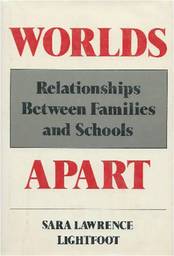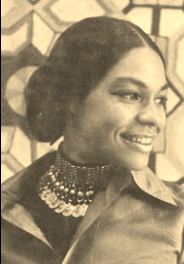|
WORLDS APART
1978 
Every day of the school year millions of American children experience an unfortunate and unnecessary difficult transition from home to school. It is a terrible irony that these two institutions, both essential to the training and education of children, should so often be in conflict.
According to Dr. Lightfoot, a professor in the Graduate School of Education at Harvard, the fault lies mainly with the educators, social scientists and policy makers who distrust and misperceive the true nature of the family-school relationship. Furthermore, she points out that the problem is particularly acute for black children and their families, for here the moral biases of social science “findings” combine with white oppression to reinforce the dogma of black inferiority. The trip from neighborhood to classroom for these children is a journey from one battle of survival to another—and an insensitive and often hostile officialdom sometimes compounds the difficulty. Worlds Apart examines the interaction of families and schools from many different perspectives--exploring the unique experience of a woman as a central figure in child rearing, tracing the historical roots and contemporary expressions of territoriality, conflict, and examining the exclusion experienced by minority groups and the poor in their attempt to get a piece of the educational pie. Particular attention is paid to the view-points of individual teachers searching for new ways of communicating with the children and parents they serve as they strive to function within the myriad institutional and interpersonal forces hey must contend with daily. With great insight and originality Dr. Lightfoot proposes methods of bridging the chasm between families and schools by building positive alliances between them. Parents and teachers must learn to see children as whole, autonomous human beings in order to be able to focus on the best interests of children. Schools must not confuse their token integration of black history into a still overwhelmingly white curriculum with real social and historical change. And teachers must view parents as the primary educators. Finally, Lightfoot suggests that family-school conflict is not only inevitable but potentially useful, and that we must find ways of discerning and redirecting its positive and negative effects. REVIEWSLightfoot’s work mercifully removes us from the fire and thunder of the racial balance battlefield, but she is no pacifist. Lightfoot takes on the educators, social scientists and policymakers who distort the nature and importance of the family, particularly of the Back family, in the effective schooling of children. But Lightfoot maintains that the promise of schooling, whether or not myth, remains strong in Americans, and has touched Black people particularly deeply.
Derrick Bell, Harvard Law Review There is in these essays the distinctive voice of a person speaking: a woman who likes and understands children, who is sympathetic and wise about the complexities of teaching, who is endlessly curious about the ways of fathers and mothers and children, and who is by turns sad and amused, bitter and detached, as she hunches in tiny classroom chairs, confronting the extraordinary human dramas that get reenacted daily in the schools. Lightfoot has a vivid sense of the unique ecology of life in each classroom, but she also sees the “walls of the classroom as windows unto the world,” reflecting for better and for worse, politics, theories of human nature, and, in a deep and poignant way, how we live in America today. Joseph Featherstone, The New Republic Lightfoot accurately depicts the weakness of previous inquiry in the relationship between families and schools by documenting the lack of research and the pathological approach of structural-functional accounts of the family in general and Black families in particular. Her analysis captures in-depth meanings framed in terms of sociohistorical forces which have influenced the contemporary conflicts and associations between Black families and classrooms. J. Steven Picou, Texas A&M University This scholarly work makes a substantial contribution to the study of the ecology of education as defined by Bronfenbrenner and Cremin. James J. Groark, SUNY at Albany Libraries Additional Reviews
Purchase
|


